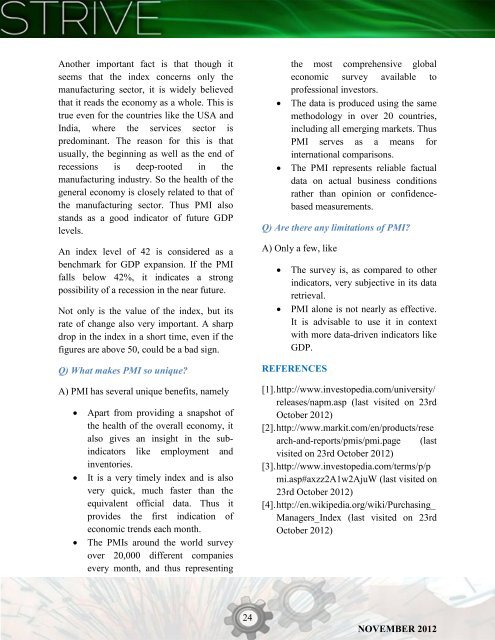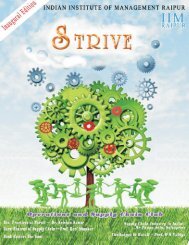sTRIVE final.pdf
You also want an ePaper? Increase the reach of your titles
YUMPU automatically turns print PDFs into web optimized ePapers that Google loves.
Another important fact is that though it<br />
seems that the index concerns only the<br />
manufacturing sector, it is widely believed<br />
that it reads the economy as a whole. This is<br />
true even for the countries like the USA and<br />
India, where the services sector is<br />
predominant. The reason for this is that<br />
usually, the beginning as well as the end of<br />
recessions is deep-rooted in the<br />
manufacturing industry. So the health of the<br />
general economy is closely related to that of<br />
the manufacturing sector. Thus PMI also<br />
stands as a good indicator of future GDP<br />
levels.<br />
An index level of 42 is considered as a<br />
benchmark for GDP expansion. If the PMI<br />
falls below 42%, it indicates a strong<br />
possibility of a recession in the near future.<br />
Not only is the value of the index, but its<br />
rate of change also very important. A sharp<br />
drop in the index in a short time, even if the<br />
figures are above 50, could be a bad sign.<br />
Q) What makes PMI so unique?<br />
A) PMI has several unique benefits, namely<br />
• Apart from providing a snapshot of<br />
the health of the overall economy, it<br />
also gives an insight in the subindicators<br />
like employment and<br />
inventories.<br />
• It is a very timely index and is also<br />
very quick, much faster than the<br />
equivalent official data. Thus it<br />
provides the first indication of<br />
economic trends each month.<br />
• The PMIs around the world survey<br />
over 20,000 different companies<br />
every month, and thus representing<br />
the most comprehensive global<br />
economic survey available to<br />
professional investors.<br />
• The data is produced using the same<br />
methodology in over 20 countries,<br />
including all emerging markets. Thus<br />
PMI serves as a means for<br />
international comparisons.<br />
• The PMI represents reliable factual<br />
data on actual business conditions<br />
rather than opinion or confidencebased<br />
measurements.<br />
Q) Are there any limitations of PMI?<br />
A) Only a few, like<br />
• The survey is, as compared to other<br />
indicators, very subjective in its data<br />
retrieval.<br />
• PMI alone is not nearly as effective.<br />
It is advisable to use it in context<br />
with more data-driven indicators like<br />
GDP.<br />
REFERENCES<br />
[1]. http://www.investopedia.com/university/<br />
releases/napm.asp (last visited on 23rd<br />
October 2012)<br />
[2]. http://www.markit.com/en/products/rese<br />
arch-and-reports/pmis/pmi.page (last<br />
visited on 23rd October 2012)<br />
[3]. http://www.investopedia.com/terms/p/p<br />
mi.asp#axzz2A1w2AjuW (last visited on<br />
23rd October 2012)<br />
[4]. http://en.wikipedia.org/wiki/Purchasing_<br />
Managers_Index (last visited on 23rd<br />
October 2012)<br />
24<br />
NOVEMBER 2012







